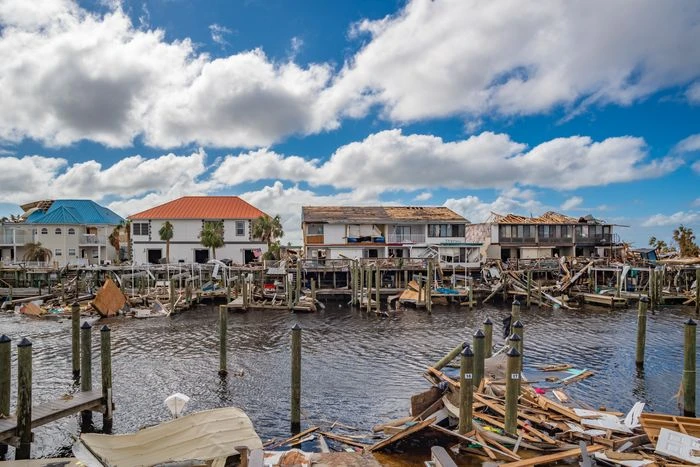
Florida residents know that even though the state’s weather creates a constant threat of property damage, homeowners property damage coverage can be limited. It’s crucial that you understand what types of damage your insurance policy covers and know strategies for maximizing the amount your insurance company pays to settle your property damage claims.
Common Types of Property Damage to Florida Homes
Beaches, lakes, and bright, sunny days are Florida’s selling points. However, the postcard-worthy weather can quickly become nasty, as every Floridian knows. As a result, Florida is a particularly vulnerable state to events that can cause home property damage.
Wind and Hurricane Damage
Hurricanes and high winds are a fact of life in the Sunshine State. Even without catastrophic damage, wind can necessitate roof repairs. A hurricane can fling debris that breaks windows or tears siding. Fallen trees can crash through your home, causing damage to the roof, gutters, ceiling, walls, and more. In the worst-case scenario, an intense hurricane can leave your home in ruins.
Hurricane damage claims may have a separate deductible for Florida homeowners. Read over your individual policy to understand how costly hurricane damage may be for you.
Water and Flood Damage
In Florida, water is never far away. Flood damage typically affects floors, baseboards, and other low-lying parts of your home. A burst pipe can create issues on higher floors. While remedying this type of damage can be expensive, foundational problems may require even more costly repairs. If you have had any flooding in your home, make sure you have a professional examine the foundation.
Standard homeowners insurance coverage in Florida doesn’t extend to flooding. You need to purchase a separate rider for your policy to include flood damage. Water damage from broken pipes or appliances is generally treated differently. Most standard homeowners insurance policies cover this type of damage. However, if the flood damage resulted from storm surges, extremely high tides, or a hurricane, your insurance company may try to deny paying a claim. Even if you have flood coverage, the specific way your policy reads determines if you get reimbursement for the damage to your home.
Hail Damage
Hail is a remarkably subtle type of damage for Florida homeowners. While cars typically show hail damage clearly, homes hide resulting blemishes. If your area suffers a hailstorm, you need to thoroughly inspect your roofing for dents or dings.
It could take a roof that suffered hail damage years to begin leaking. By that time, it may be too late to file a property claim with your insurance company. Once the weather is safe, a professional check on your roof is advisable. If there is damage, you can file a claim with your insurance provider.
Fire Damage
Fire damage claims in Florida vary from other types of property problems. First, flames and smoke cause different issues than the weather. Second, a fire can start—and spread—anywhere within the home. While the kitchen or a backyard grill are common areas for ignition, electrical fires can occur anywhere. Homeowners insurance typically covers the costs of repairs and replacement of belongings.
Other: Sinkholes and More
Some types of property damage occur in Florida far more often than in other states.
Sinkholes are a significant problem on the peninsula due to a layer of rock beneath the ground. Florida’s wet climate makes these issues worse. That’s why Florida has more sinkholes than any other state. A sinkhole can wreck your home and the value of the land it sits on. Your homeowners Insurance policy may not cover sinkhole damage that doesn’t result in the complete destruction of your home.
Tornadoes are also a Florida-specific problem. Despite the common association with Oklahoma and Kansas, Florida has more tornadoes per 10,000 square miles of land than any other state. Especially with Florida’s higher and denser population, tornadoes are a real threat to homeowners. Unlike floods, insurance providers usually don’t require special coverage for tornado damage.
Finally, mold is a continuous threat to properties in Florida, particularly if your home suffers water or flood damage. However, the constant high humidity can cause trouble in any poorly ventilated space. Mold damage can be costly to remedy, and homeowners insurance typically covers it only if a covered incident caused the damage.

Statute of Limitations on Filing a Property Damage Lawsuit
All homeowners should be aware of the statute of limitations for filing a lawsuit regarding insurance claims. A statute of limitations is a legal rule that prevents you from suing once a specified amount of time passes. In Florida, the statute of limitations for breach of contract suits is five years.
Because an insurance policy is a legal contract, this means you only have five years after an incident to bring legal action against your insurance company. Filing a lawsuit is sometimes the only option you have, whether your insurer denies your claim outright or doesn’t offer a full settlement,
Therefore, moving quickly after your property suffers damage is essential. Insurance companies can drag their feet and make you think a better offer is coming in the future. Starting the clock on a claim soon after you need it can help you avoid being subject to the statute of limitations in the future.
Filing a Property Damage Claim
If you’re unfortunate enough to need to file a property damage claim with your insurance company, follow these steps to protect yourself.
First, contact your insurer as soon as possible after an incident. This puts you in line for an appointment with an adjuster. The insurance company may also offer services to prevent further damage, such as temporary roof or window repair.
Next, take pictures of everything. Then take more pictures. Documenting the damage as soon as it occurs can help defend against bad faith insurers. Photograph problem areas extensively, as well as any items you need to throw out before you trash them.
Finally, keep notes on who you talk to at your insurance company and when. This is a hectic process for you, so recording all interactions will assist your memory later when determining how much your claim is worth.

When to Contact a Lawyer
One additional suggestion when filing a homeowners policy insurance claim: Call a property attorney. Having a lawyer on your side makes the entire claims process smoother. The experienced team at GED Lawyers can offer suggestions for what to do before, during, and after filing a claim.
It’s important to remember that insurance companies are not on your side, and a first offer is never the best. GED Lawyers can handle negotiations with your insurance provider to ensure you receive the settlement offer you deserve. If your Florida home has suffered property damage, schedule a free case review with the skilled attorneys at GED Lawyers today to discuss your options.

